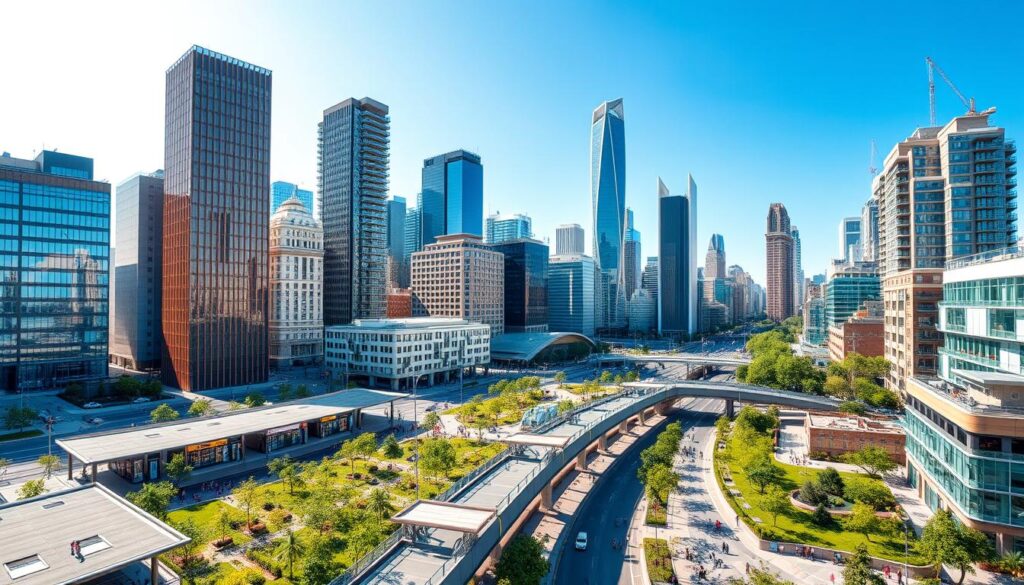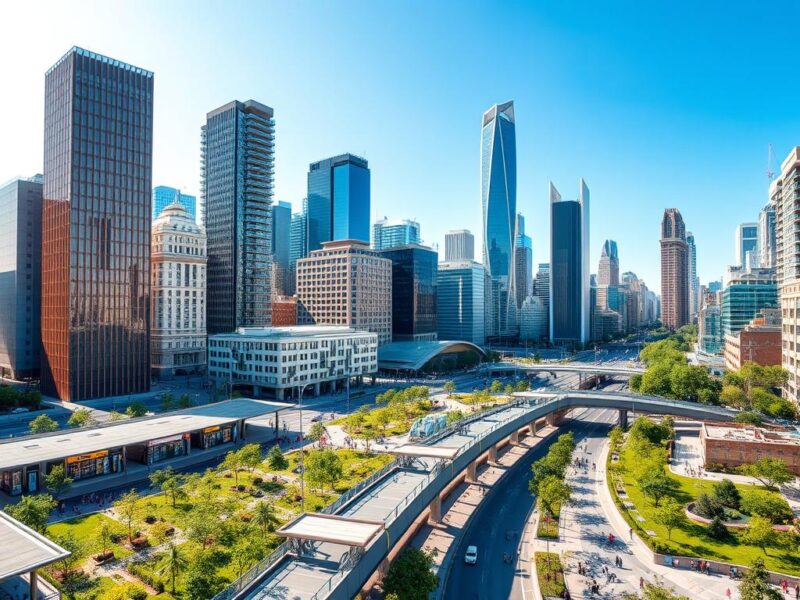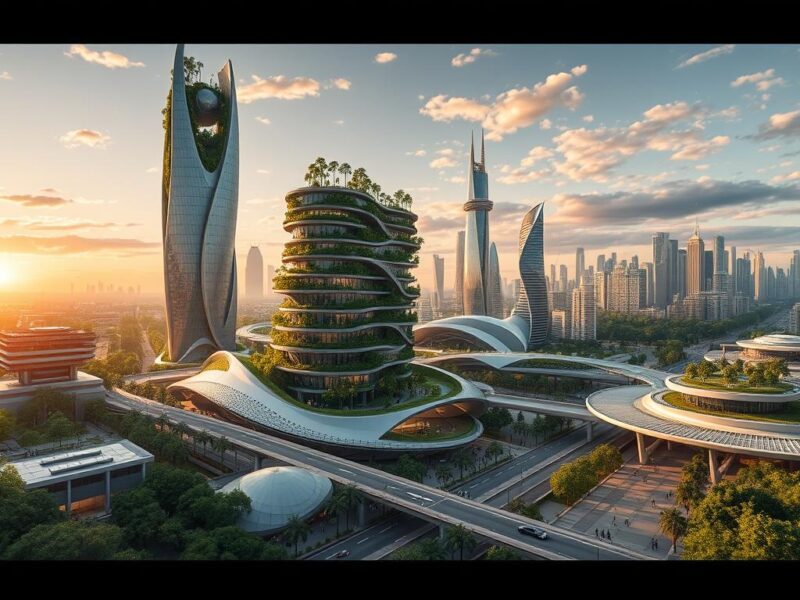City Concept Evolution Property Development by SOU
Last Updated on: 4th October 2024, 01:23 pm
This Listing has not been verified yet and we do not guarantee the completeness or accuracy of the data. If you are the Property Owner, please Sign In, then Click Here or on “Claim Listing” to claim your listing.
The City Concept Evolution Property Development by SOU represents a groundbreaking approach to urban planning and development, focusing on sustainable solutions for the future of our cities. As urban areas expand, challenges such as infrastructure maintenance, livability, and environmental sustainability arise, emphasizing the necessity of innovative methods. This initiative aims to redefine city landscapes through property developments that prioritize sustainability and community engagement, ensuring that the vision for future cities is not only about space but also about enhancing quality of life. For a deeper understanding of the principles guiding this evolution in urban design, one can explore the findings on the shared properties of cities regarding their complexity and scaling dynamics from urban science research1.
Key Takeaways
- The focus on sustainable development is crucial for addressing modern urban challenges.
- Community engagement plays a significant role in enhancing urban projects.
- Innovative urban designs can contribute to improved property values in strategic locations.
- Leveraging historical urbanization theories can inform contemporary city development.
- Understanding scaling theories helps clarify population and area dynamics in urban systems.
Introduction to City Concept Evolution
The evolution of urban planning reflects a complex interplay between historical influences and contemporary trends. As cities continue to grow, the strategies employed for real estate development must adapt to address challenges like overpopulation and environmental sustainability. Ancient civilizations such as those in Rome, Athens, and Babylon emphasized order and symmetry in urban design, laying the groundwork for modern city planning principles2. Today, cities utilize innovative strategies to create livable environments that prioritize community engagement and resilience.
Overview of Urban Planning and Development Trends
Modern urban planning embodies a shift towards mixed-use developments, blending residential, commercial, and recreational spaces. For instance, cities like Florence, Venice, and Edinburgh leverage Renaissance ideals focusing on beauty and public spaces2. The trend of establishing smart cities integrates digital technologies for enhanced resource management, providing an opportunity for improved citizen engagement and traffic flow optimization. Cities such as Copenhagen and Singapore are recognized today for their commitment to sustainable urban design that fosters innovation while promoting energy-efficient practices3.
Importance of Sustainable Development in Modern Cities
Sustainable development serves as a cornerstone for urban regeneration initiatives. By integrating ecological balance, resource efficiency, and social equity, urban planners create living spaces that cater to contemporary needs without jeopardizing future generations’ well-being. Effective environmental impact assessments are crucial for identifying potential adverse effects of urban projects on surrounding ecosystems, ensuring developments are aligned with long-term sustainability goals. Following the examples set by cities like Medellín, notable for their forward-thinking strategies, urban areas worldwide are increasingly prioritizing renewable energy sources and efficient public transportation systems to combat pollution and enhance residents’ quality of life3.

| City | Key Historical Influence | Modern Trend |
|---|---|---|
| Rome | Symmetry and order | Mixed-use developments |
| Florence | Renaissance ideals | Sustainable design |
| Copenhagen | Innovative urban design | Smart city technology |
| Medellín | Environmental initiatives | Renewable energy adoption |
City Concept Evolution Property Development by SOU
SOU’s innovative approach to urban design plays a vital role in city regeneration efforts, focusing on maximizing community interaction and sustainability. By employing vertical urbanism, SOU minimizes land use while maximizing living space, preserving green areas and habitats, which is essential for reducing urban sprawl. Modern cities benefit significantly from such innovative property development strategies that merge aesthetics with ecological considerations.
Innovative Approach to Urban Design and City Regeneration
This approach involves creating environments that are aesthetically pleasing and maintain functionality. As cities evolve, integrating ‘green’ streets and new corridors has become a priority, promoting social life and enhancing urban spaces. According to research, investing in mass transit and developing walking and cycling corridors can reduce carbon emissions in cities by 5-15 percent, reinforcing the importance of sustainable development in current urban practices4.
Community Engagement and its Role in Urban Development
Community engagement is crucial in urban development, fostering inclusivity and ensuring local needs are met. SOU emphasizes engaging with residents and stakeholders, taking diverse perspectives into account. Such effective engagement strategies lead to projects that resonate with the community’s desires, promoting responsible ownership towards their environment and enhancing urban collaboration. Notably, urban renewal often targets economic and social barriers, creating opportunities for communities in need5.
Environmental Impact Assessment and Sustainability Measures
Environmental impact assessments guide SOU’s property development strategy, balancing urban growth with ecological integrity. These assessments pinpoint potential environmental risks, allowing for necessary sustainability measures to be enacted. By adopting practices like using recycled materials and energy-efficient systems, SOU not only reduces carbon footprints but also strengthens the resilience of urban environments. For instance, the ‘Transform Freetown’ initiative aims to increase vegetation cover by 50 percent by planting one million trees, showcasing a commitment to sustainability45.

Conclusion
The City Concept Evolution Property Development by SOU signifies a groundbreaking approach to urban planning, prioritizing sustainable development methods that cater to an expanding urban populace. With current studies indicating that half of the world’s population resides in urban areas, a figure expected to rise to 70% by 2050, the need for innovative frameworks in the urban landscape is more crucial than ever6. By embracing designs that foster community engagement and implementing environmental assessments, SOU adeptly manages urban challenges while building a resilient infrastructure for future generations.
As cities evolve, the impacts of commerce, infrastructure, and social dynamics must be considered to optimize land usage and overall city liveability. According to recent reports, urban transformation is not merely a trend but a systematic change that involves multiple dimensions, including social, economic, and ecological factors7. This holistic perspective is essential for developing spaces that are adaptable and beneficial to all residents, reinforcing SOU’s commitment to creating a vibrant urban environment.
Ultimately, the ongoing evolution of urban planning through initiatives like the City Concept Evolution Property Development by SOU paves the way for smarter, more inclusive, and sustainable development practices. By recognizing the intrinsic value of land as a cornerstone for wealth creation, SOU sets a transformative example for future city developments, aligning with the pressing need to rethink how we engage with urban spaces as highlighted in the recent whitepaper. As urban challenges escalate, the vision of adaptable, thriving cities becomes not just a necessity but an attainable reality6.
FAQ
What is the City Concept Evolution Property Development by SOU?
How does SOU ensure sustainability in its property developments?
What role does community engagement play in SOU’s urban planning initiatives?
What are some key trends in urban planning reflected in SOU's projects?
How does SOU address urban regeneration challenges?
Why are environmental impact assessments important in property development?
Source Links
- https://newsite.ipsef.net/news/evolution-luxury-living-branded-schools-residential-property-development
- https://urbandesignlab.in/history-of-urban-design-from-ancient-to-modern-cities/
- https://www.cambridge.org/core/books/ancient-city/introduction-the-ancient-city-as-concept-and-reality/D8D0CB3F238E0C66623D6C93A8F033EE
- https://www2.deloitte.com/us/en/insights/industry/public-sector/future-of-cities.html
- https://en.wikipedia.org/wiki/Urban_renewal
- http://www.scielo.org.za/scielo.php?script=sci_arttext&pid=S2224-78902023000100008
- https://urbantransformations.biomedcentral.com/articles/10.1186/s42854-021-00019-z



